‘I Believe in Asking Tough Questions,’ Even of the Industry
King-to-Be Charles in Dispute Over His Wokeness
Coronation Gave Jet Magazine Its Society Editor
[btnsx id=”5768″]
Donations are tax-deductible.
Gwen Ifill, the late PBS anchor, introduces Bernard Shaw as he accepts the 2007 Lifetime Achievement Award from the National Association of Black Journalists. Shaw told Television Week reporter Allison J. Waldman, “To me, the NABJ is a Bible among core groups in the Black community, so to me, this is trumpeting recognition from the altar. I really feel that way. I genuflect with quiet appreciation.” (Credit: YouTube)
‘I Believe in Asking Tough Questions,’ Even of the Industry
Bernard Shaw, who set the example of a Black television journalist who could report in the style of his idols Walter Cronkite and Edward R. Murrow, yet call out his industry for insufficient attention to diversity, died Wednesday of pneumonia unrelated to Covid-19, Shaw’s family announced Thursday. He was 82, CNN reported.
In a career spanning 40 years, Shaw might be best known for delivering live news reports from Baghdad at the onset of the Gulf War in 1991, reporting on the student revolt in Tiananmen Square in May 1989, perhaps covering the1995 terrorist bombing in Oklahoma City, or asking Democrat Michael Dukakis the toughest question in the1988 presidential debate.
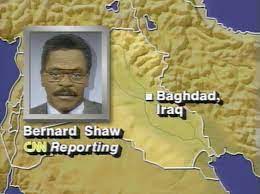
But overall, Shaw’s fealty was to hard-nosed Murrow-style reporting at CNN, a concept that some say went out of favor in the years after Shaw retired as CNN anchor in 2001 and is now the subject of debate as the network’s newest managers seek to rein in what they view as an opinionated, leftward tilt.
“I wouldn’t think of myself as a journalist of color,” Shaw told a 2014 town hall meeting sponsored by CNN’s Diversity Council. “But I’m a journalist first. Strive to be the very best and use models that exemplify the very best.”
“I wouldn’t think of myself as a journalist of color,” Shaw told a 2014 town hall meeting sponsored by CNN’s Diversity Council. “But I’m a journalist first. Strive to be the very best and use models that exemplify the very best.”
And yet, when Shaw received the Lifetime Achievement Award in 2007 from the National Association of Black Journalists, he struck out at unnamed media owners who are “sabotaging the public good” with their “profit fixations,” and he warned white men that they ignore diversity at their peril.
“Journalists, hear me tonight,” Shaw told the NABJ awards banquet audience in Las Vegas. “There are some owners in the business — bosses, parent companies — whose profit fixation and staffing directives and decisions sabotage the public good they profess to serve.
“They are turning the people’s right to know into the people’s fight to know,” he said.
“Beyond this ballroom tonight, white males, wake up,” Shaw continued. “Globally, you are an island speck in an ocean of color.
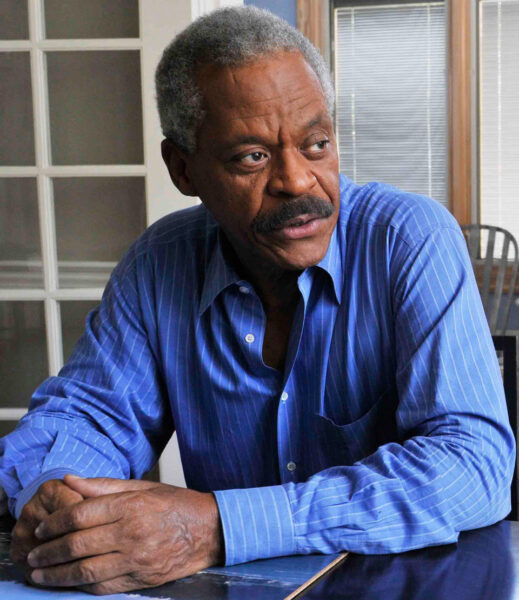
(Photo by Jason Miccolo Johnson, 2012)
“The reins of power will weaken and so will your grip — if you do not faithfully support our nation’s greatest strength, diversity. “To you, caught in the middle, stay vigilant. You must stay strong.”
Shaw emphasized the word “globally” in discussing his remarks afterward with Journal-isms, saying he was aiming at a worldwide audience. “What matters is that my words give hope” to people of various ethnic groups, he said. Shaw would not name the white [men] or the companies he was talking about.
“People in the media know who they are,” he said. “All you have to do is look at the numbers. They know who they are and we know who they are.”
Shaw added, “I was speaking for the historical record. I expect my words to resonate long after I’m dead. . . . That was in the tradition of Frederick Douglass,” the first well-known Black journalist, he said. “I was seeking to inspire, to inform and to light a fire under some asses.”
Shaw grew up on the South Side of Chicago and went to a tough high school, as others have noted. Shaw told Allison J. Waldman of Television Week, also in 2007, “The battle is never won. There are some people who still believe that people of color are not needed in this country. And yet people of color have been the essence of this country since its beginning. So there’s a great education requirement, and all of us are educators and we’re going to make this country work.”
Nine years later, when “NBC Nightly News” anchor Lester Holt accepted “Journalist of the Year” honors from NABJ, Holt paid tribute to those who came before, including ABC’s Max Robinson and Carole Simpson, NBC’s Bryant Gumbel, and Shaw. “These are people that opened the doors for people like me to walk through and therefore it’s
incumbent on all of us to remember that many of us are the products of great mentors,” said Holt. “Our diversity in newsrooms simply makes us better,” he added.
Holt might have added the late Ed Bradley of CBS’ “60 Minutes,” whom Shaw called a “walking inspiration.” The two were friends.
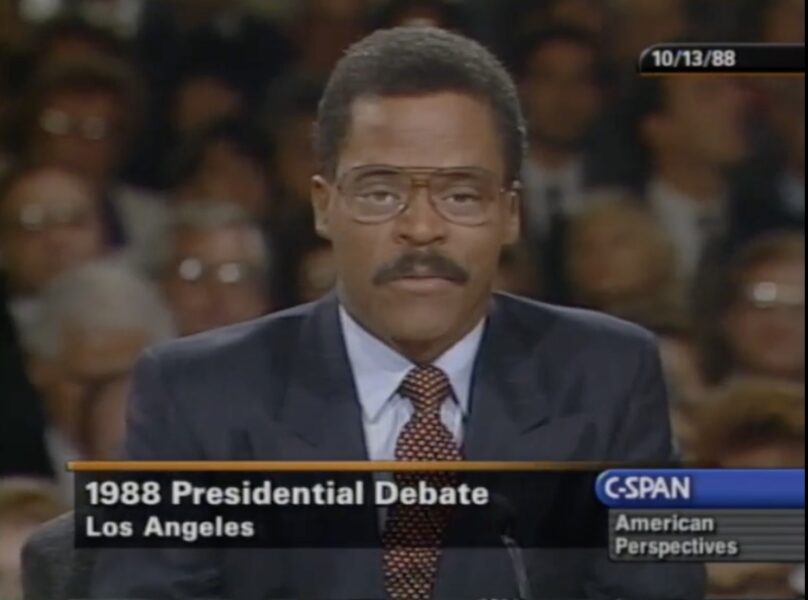
“Governor, if Kitty Dukakis were raped and murdered, would you favor an irrevocable death penalty for the killer?”
In Politico, Roger Simon told the story of Shaw’s infamous presidential debate question to Dukakis, the Democratic Massachusetts governor who was debating Republican Vice President George H.W. Bush.
“On stage, Bush entered from the left and Dukakis from the right. Dukakis stuck out his hand about 15 feet away from Bush and had to carry it across the stage like a spear before Bush got near enough to shake it.
“They stood behind their lecterns. By agreement, Dukakis got to stand on a small sloping platform that was hidden behind his. This hid the fact he was much shorter than Bush.
“Shaw, looking commanding and stern, began: ‘By agreement between the candidates, the first question goes to Gov. Dukakis. You have two minutes to respond. ‘Governor, if Kitty Dukakis were raped and murdered, would you favor an irrevocable death penalty for the killer?’
“In the press room, there were gasps from the reporters. ‘Whaaaa?’ ‘Did he really say that?’ ‘Un-BELIEVE-able.’
“Any TV director worth his headphones would have immediately ordered a camera to get a reaction shot from Kitty, who was sitting in the audience. After all, it was her rape and murder being talked about.
“But reaction shots of the candidate’s families were expressly forbidden by the debate agreement. So the camera stayed locked on Dukakis.
“And Dukakis answered instantly and smoothly. ‘No, I don’t, Bernard,’ he said. ‘And I think you know that I’ve opposed the death penalty during all of my life.’
“He had been on the record for years and years on that subject. Massachusetts had no death penalty and also had one of the lowest crime rates of any industrialized state in the country. Dukakis didn’t believe in capital punishment. He had seen all the studies and he didn’t believe it deterred crime.
“So should he throw out that principle because the hypothetical victim was now his wife? Is that what principles were all about? They were good when others’ loved ones were involved but not good when your own were involved?
“In the press room, the murmurs over Shaw’s question now turned to mutters over Dukakis’ answer. ‘He’s through.’ ‘That’s all she wrote.’ ‘Get the hook!’
At a 2014 CNN gathering in Washington, Shaw told CNN journalists, “While changes are here and more changes must come, corpus CNN, corpus CNN will always be. The arms and the legs may wiggle . . . but the heart beats and pounds journalism, journalism, journalism.” (Credit: YouTube)
Simon also wrote:
“It was the most controversial [question] ever asked at a presidential debate. It was asked on Oct. 13, 1988 . . .
“Shaw was not your average journalist. Shaw really liked to see the candidates sweat. He liked to see the panic in their eyes.
“He liked to zip in a high, hard question right from the start and see these men who run for president gulp and gape and search their memories for the answer they had read in their briefing books.
“Except that the answers to Shaw’s questions were almost never in the briefing books.
“He had asked Al Gore what he would do if he or one of his children got AIDS. He asked Dan Quayle if it was “fear of being killed in Vietnam’ that caused him to join the National Guard. He had asked Al Haig, flat out: ”Do you think Bush is a wimp?’
“Bernard Shaw was one tough customer.
” ‘As reporters, we were not doing our jobs if we don’t ask the toughest question possible,’ Shaw said.
” ‘I couldn’t not do that. I’m from the Chicago school of journalism. I believe in asking tough questions. This whole process is too easy on politicians. They fly up and down the country asking for votes and they ought to be forced to stand up and say what they really feel. Otherwise the voters are being jilted.’
“Shaw, an anchorman for CNN, grew up on the South Side of Chicago, went to a tough high school and at age 13 had seen how Edward R. Murrow had stood up to Sen. Joe McCarthy.
“While others had cowered, Murrow had taken McCarthy on. A lot of people had told him he was being too tough, he was committing professional suicide, but Edward R. Murrow did not care what others said.
” ‘He was,’ Shaw said, ‘my idol.’ “
“Funeral services for Shaw will be closed to family and invited guests only, with a public memorial service planned at a later time, his family said,” CNN reported.
“In lieu of flowers, the family requests donations be made to the Bernard Shaw Scholarship Fund at the University of Chicago. The Shaw family requests complete privacy at this time,” the family said in their statement provided by former CNN CEO Tom Johnson.
- Jonathan Brunt, Spokesman-Review, Spokane, Wash.: Spokane civil rights activist Sandy Williams was aboard plane that crashed in Puget Sound
- Dylan Byers, Puck: Stelter’s Silence of the Lambs
- Vivian Kane, the Mary Sue: CNN’s New President Made His First Hire: A Top NYPD Cop Best Known for Denying Post-9/11 Racist Practices
Many readers noted the omission of themes in Prince Charles’ contribution to the Voice, such as Harry and Meghan’s allegations of racism within the royal family, royal exemption from equality legislation, slavery and reparations. (Credit: YouTube)
King-to-Be Charles in Dispute Over His Wokeness
The ascension of Prince Charles to the British throne after the death Thursday of his mother, Queen Elizabeth II, will come amid a dispute involving the prince and Britain’s leading Black newspaper, the Voice.
Two days ago, Nadine White wrote for the Independent, “Britain’s leading Black newspaper is calling for the royal family to apologise and pay reparations for slavery amid backlash aboutPrince Charles guest editing the paper.
“The Prince of Wales took over The Voice newspaper’s September edition which unleashed a torrent of criticism from readers. A well-placed source told The Independent that some backlash was anticipated during the planning process but overlooked. . . .”
“The prince quoted Jamaican reggae legend, Bob Marley, in his editor’s letter, in which he said he was ‘so touched’ to be asked to edit the newspaper, adding how he has always found Britain’s Black communities to be ‘a great source of inspiration.’ ”
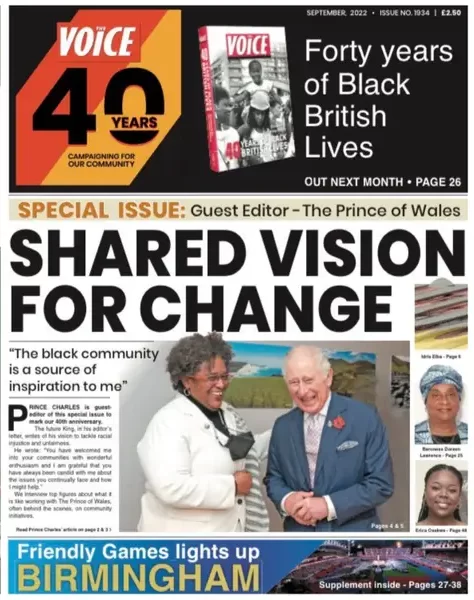
Lester Holloway, The Voice’s editor, said as the 40th anniversary issue was prepared, “Our readers may be surprised at the parallels between the issues which The Voice has campaigned on for four decades and the work the Prince of Wales has been involved in over the same period, often behind the scenes.
“In past decades these causes were once scorned and ridiculed, but today they are widely acknowledged.” Holloway added, that “all the research tells us how far we have to go to be a truly equal society.
“The Prince has an awareness of this, and that in itself is a reason to be hopeful.”
Despite those words, however, “condemnation was swift, with many readers noting the omission of themes in Charles’ contribution, such as Harry and Meghan’s allegations of racism within the royal family, royal exemption from equality legislation, slavery and reparations,” the Independent reported.
“When approached by The Independent, a spokesperson for The Voice said: ‘We recognise the strong feelings some of our readers have over this edition and the divergence of views in the community.’ . . .
“The monthly newspaper’s editor Lester Holloway expanded on the newspaper’s ‘key demand’ on a slavery apology during a BBC London interview on Sunday.
“ ‘All of the institutions, including the royal family, that have been involved in the historical horrors of colonialism have not apologised for slavery and what we’ve got is statements of personal regret which is absolutely not good enough,’ he said. ‘I think it’s appalling that nobody has apologised for slavery.’ ”
Meanwhile, the Voice reported that tributes from the Black community are already pouring in for Her Majesty.”
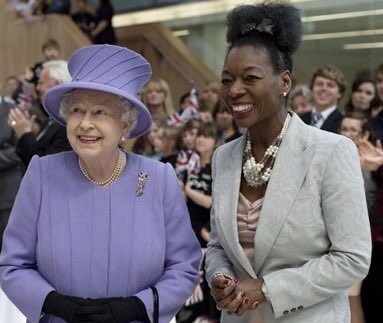
Among those quoted was Baroness Floella Benjamin (pictured, with the queen, credit: The Voice), who is Black.
She told The Voice, “Her Majesty The Queen was an outstanding example of dedication to duty and commitment to her role as monarch. I have great lasting memories of meeting her over the decades. She was a woman of faith so I’m sure she was prepared. May she rest in peace.”
The Voice added, “Following the Queen’s death, the United Kingdom and the Commonwealth states will observe a period of mourning lasting 10 days in which millions of her subjects deal with the loss of their monarch.”
- British Heritage Travel: Did Queen Elizabeth really fall in love with this world leader? (Aug. 4)
- Lillian Gissen, dailymail.com: Inside the Queen’s enduring bond with Michelle Obama: Former First Lady formed special friendship with Her Majesty that began when they broke ‘rubbish’ royal protocol — and blossomed into ‘gossip’ sessions and ‘sleepovers’ at Buckingham Palace
- Jill Lawless, Associated Press: New UK Cabinet is diverse in makeup and solidly on the right
- Paul Meara, bet.com: Barack and Michelle Obama Join World In Mourning Passing of Queen Elizabeth II
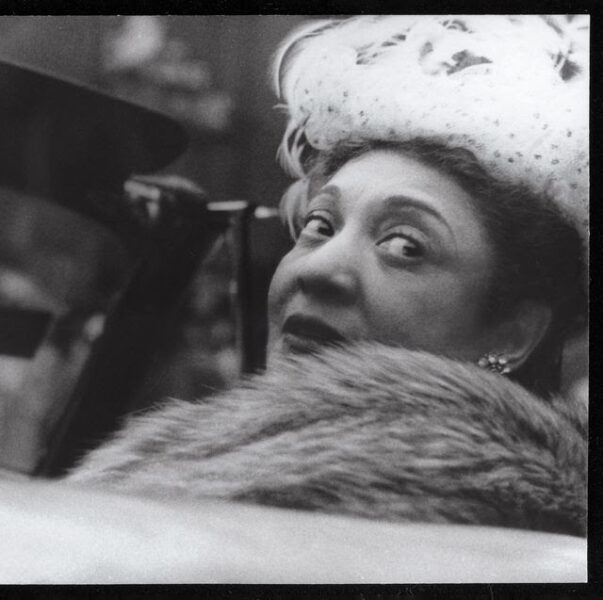
magazine, where she wrote about society and travel. (Credit: Carl Van Vechten/Ebony)
Coronation Gave Jet Magazine Its Society Editor
Gerri Major was Jet magazine’s society maven from 1951, the year it was founded, until her death in 1984. For that, readers can thank the coronation of Queen Elizabeth II.
Founder-publisher John H. Johnson explained in his autobiography, written with Lerone Bennett Jr., in 1989:
In his efforts to lure writers to Chicago to work for his company, “No one gave me a harder time than Gerri Major, the New York Amsterdam News society editor. I was trying to establish Jet as a magazine for all people from the lowest levels to the highest, and I needed Gerri, a descendant of a distinguished family who’d married a prominent doctor and who knew every important Black.
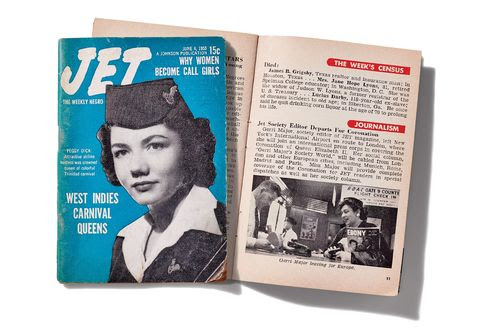
I explained all this to her and offered twice what she was making at the Amsterdam News. We agreed on the salary, and she went to the office of Dr. C.B. Powell, the publisher, to tell him that she was resigning.
“Powell, who was a friend as well as an employer, started crying and told her, ‘You can’t leave me!’ Whereupon Gerri started crying. She called me and said she couldn’t accept the position, and then I cried.
“I didn’t get where I am today by accepting the first no as a final no. I sent Gerri a Christmas present in 1951. I dropped her little notes of congratulations on stories she’d written. Then history dealt me an ace — the coronation of Queen Elizabeth II. No self-respecting socialite could turn down a chance to see that event up close. So I arranged
for accreditation and called Gerri again.
” ‘Gerri,’ I said, ‘we just got accreditation to send a reporter to cover the coronation of the queen. I don’t know anyone who belongs there more than you. Before I give the assignment to someone else I just wanted to run it by you one more time.’
“There was a squeal on the telephone. ‘Oh, Mr. Johnson,’ she said. ‘You know I can’t turn that
down. All my life I’ve wanted to be present at something like that. Of course I’ll take it . . . “
‘[btnsx id=”5768″]
To subscribe at no cost, please send an email to journal-isms+subscribe@groups.io and say who you are.
Facebook users: “Like” “Richard Prince’s Journal-isms” on Facebook.
Follow Richard Prince on Twitter @princeeditor
Richard Prince’s Journal-isms originates from Washington. It began in print before most of us knew what the internet was, and it would like to be referred to as a “column.” Any views expressed in the column are those of the person or organization quoted and not those of any other entity. Send tips, comments and concerns to Richard Prince at journal-isms+owner@
View previous columns (after Feb. 13, 2016).
View previous columns (before Feb. 13, 2016)
- Diversity’s Greatest Hits, 2018 (Jan. 4, 2019)
- Book Notes: Is Taking a Knee Really All That? (Dec. 20, 2018)
- Book Notes: Challenging ’45’ and Proudly Telling the Story (Dec. 18, 2018)
- Book Notes: Get Down With the Legends! (Dec. 11, 2018)
- Journalist Richard Prince w/Joe Madison (Sirius XM, April 18, 2018) (podcast)
- Richard Prince (journalist) (Wikipedia entry)
- February 2018 Podcast: Richard “Dick” Prince on the need for newsroom diversity (Gabriel Greschler, Student Press Law Center, Feb. 26, 2018)
- Diversity’s Greatest Hits, 2017 — Where Will They Take Us in the Year Ahead?
- Book Notes: Best Sellers, Uncovered Treasures, Overlooked History (Dec. 19, 2017)
- An advocate for diversity in the media is still pressing for representation, (Courtland Milloy, Washington Post, Nov. 28, 2017)
- Morgan Global Journalism Review: Journal-isms Journeys On (Aug. 31, 2017)
- Diversity’s Greatest Hits, 2016
- Book Notes: 16 Writers Dish About ‘Chelle,’ the First Lady
- Book Notes: From Coretta to Barack, and in Search of the Godfather
- Journal-isms’ Richard Prince Wants Your Ideas (FishbowlDC, Feb. 26, 2016)
- “JOURNAL-ISMS” IS LATEST TO BEAR BRUNT OF INDUSTRY’S ECONOMIC WOES (Feb. 19, 2016)
- Richard Prince with Charlayne Hunter-Gault, “PBS NewsHour,” “What stagnant diversity means for America’s newsrooms” (Dec. 15, 2015)
- Book Notes: Journalists Follow Their Passions
- Book Notes: Journalists Who Rocked Their World
- Book Notes: Hands Up! Read This!
- Book Notes: New Cosby Bio Looks Like a Best-Seller
- Journo-diversity advocate turns attention to Ezra Klein project (Erik Wemple, Washington Post, March 5, 2014)
Page views: 1431 at 9:01 a.m. Sept. 17, 2022

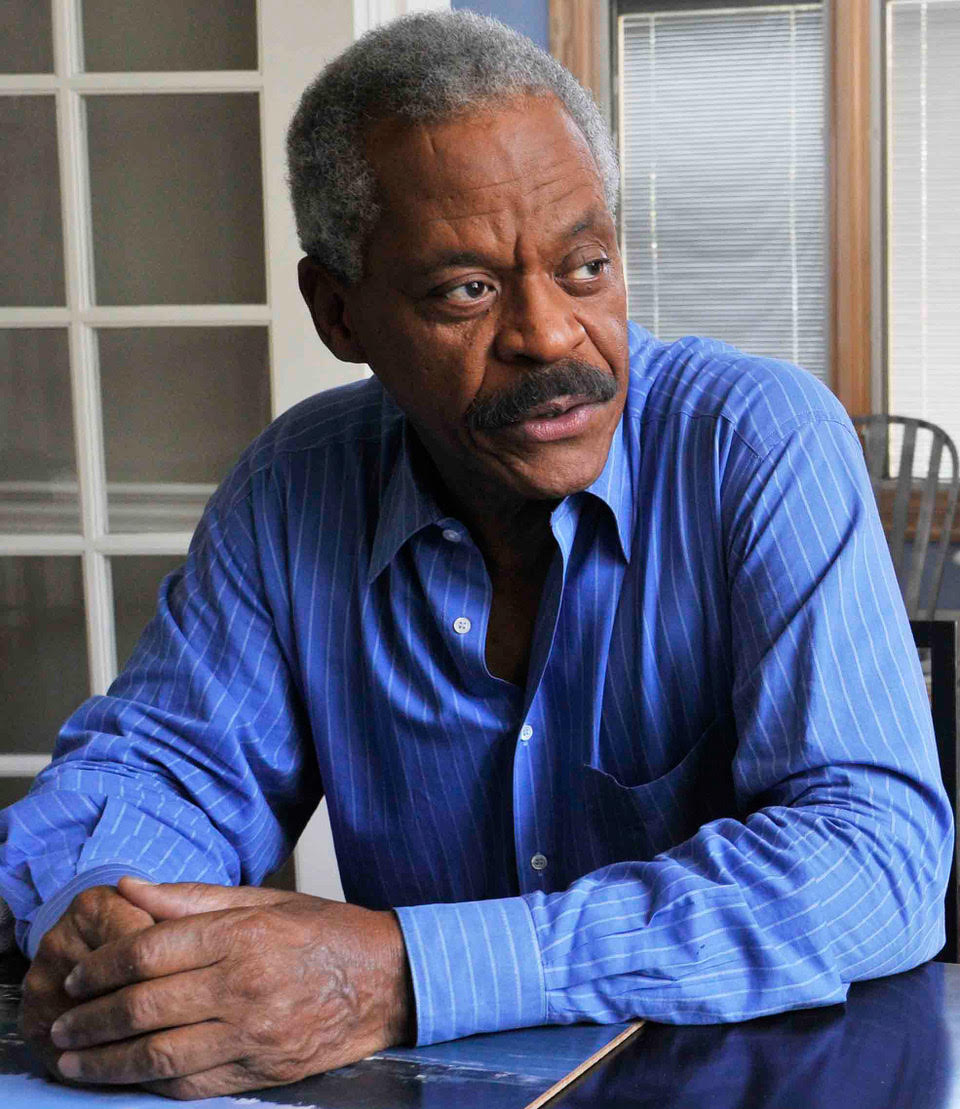
1 comment